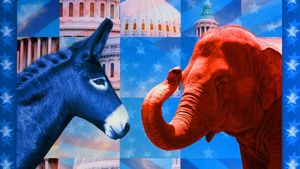MEXICO CITY — Mexico has taken significant steps recently, changing its constitutional framework to limit judicial review over constitutional amendments. This has created quite the stir, as both federal and state legislatures, thoroughly backed by the ruling Morena party, passed these amendments which curtail the judiciary’s power to challenge reforms.
Historically, the courts held the authority to assess whether new reforms aligned with existing constitutional provisions or international treaties Mexico had agreed to. Starting now, though, any reform blessed by two-thirds of the federal Congress and state legislatures can no longer face legal scrutiny. This fundamentally shifts the balance of power within the government.
The Morena party—a political group established by Andrés Manuel López Obrador, Mexico's former president who exited office on September 30, has been particularly proactive. Their agenda was met with considerable opposition when past judicial decisions obstructed some of López’s key proposals. For example, when the former president sought to pass laws favoring state-run utilities, the courts intervened, deeming such actions contrary to Mexico's competitive market laws. The current president, Claudia Sheinbaum, who succeeded him on October 1, remains committed to advancing similar policies.
So, what does this mean for the average citizen? Critics of these amendments express serious concern over potential losses to democratic safeguards against governmental overreach. The Amiable criticism principally revolves around the erosion of checks and balances. They argue this development effectively silences citizens' ability to challenge violations of their rights through judicial avenues.
With courts effectively stripped of their power to question constitutional changes, some observers have voiced fears about the future of legal recourse. The ruling party contends this is necessary, insisting judicial entities shouldn’t assume superiority over those elected to represent the populace. Yet many believe this move severely undermines the checks and balances integral to any functional democracy.
These sweeping changes represent just one facet of the broader patterns of reform the Morena party has pushed through using its commanding legislative majorities. Recently, amendments have also included moving to militarize federal law enforcement, with many reforms rushed through with scant discussion or time for thorough evaluation by lawmakers.
Critics have pointed out the troubling notion: Should any political party, armed with legislative majorities and control over the presidency, be allowed unchecked power? Could this lead to scenarios where fundamental alterations to the Constitution could take place with minimal pushback, including the hypothetical declaration of Mexico as something akin to a monarchy?
The threat to judicial independence raises concerns not only about the legal framework but also about the potential for politicization of the judiciary. There are worries this could extend to the very process of electing judges, as proposals have surfaced mandatorily requiring all judges, including those serving on the Supreme Court, to stand for elections. Many fear this turns judicial appointments from professional qualifications toward political alignment.
The qualifications set for judicial candidates have stirred debate as well. Minimal requirements include letters of recommendation from local constituents and maintaining decent academic performance, alongside vague stipulations pertaining to “legal experience.” This drastically differs from the rigor and the lengthy civil-service routes traditionally required for judgeships, potentially reopening avenues for manipulation by powerful interests, such as drug cartels, who could financially back candidates.
While the Supreme Court may still deliberate over the constitutional reforms, the grounds for doing so seem quite limited, especially with indications from the justices themselves to resign come August due to newly established election requirements for judges.
At present, the judiciary stands on precarious ground—it appears there are few choices left for citizens seeking accountability through domestic legal channels, except possibly pursuing avenues through international courts.
These developments place Mexico’s legal structure on unsure footing. Unlike other nations where individuals can contest laws or constitutional changes, Mexico's revised framework seems to tightly restrict such mechanisms, leaving citizens with fewer options for legal defense. The idea of federally disbanding judicial oversight may be unprecedented, typically reserved for local courts.
With voices raising concern over these shifts, many point toward what this might mean for the future of democracy and law within the country. Will Mexico maintain its democratic principles, or is the push for reform indicating something more insidious?
The evolution of these laws could usher in significant transformations within the Mexican political and judicial landscapes, with uncharted consequences for citizens and governance alike. For those following along, this story continues to evolve, and Mexico’s commitment to the rule of law remains placed under renewed scrutiny.
Follow AP’s coverage of Latin America and the Caribbean for more on the continuously developing situation.



